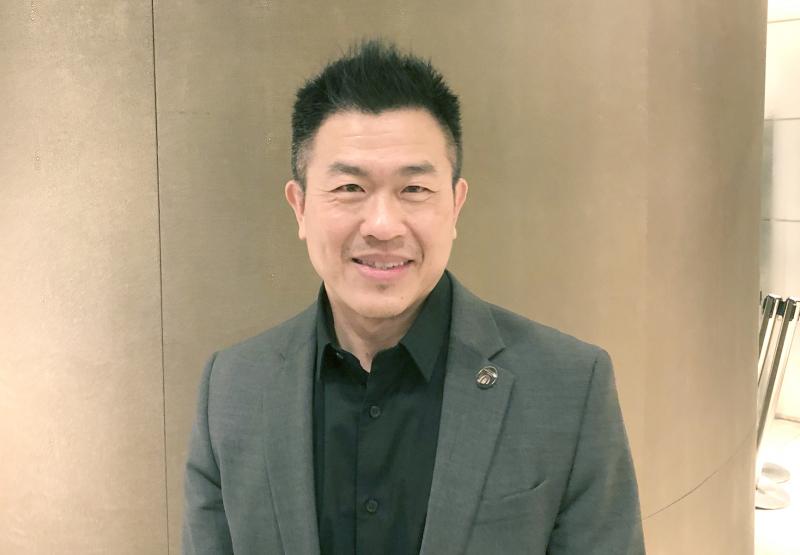Hon Hai Precision Industry Co (鴻海精密) on Tuesday said that more than 400 firms have joined its platform for electric vehicles (EVs) that is open to outside developers.
The company’s promotion of the platform, dubbed the MIH Open Platform, has attracted more than 400 participants to collaborate on resolving potential bottlenecks in the development of the emerging technology, Hon Hai chief technology officer William Wei (魏國章) told an economic forum in Taipei.
Hon Hai in February last year announced a joint venture with automaker Yulon Group (裕隆集團) to manufacture EVs in two years’ time.

Photo: CNA
Under the venture, Yulon subsidiary Hua-chuang Automobile Information Technical Center (華創車電) is focusing on vehicle design and use of the MIH Open Platform, which would provide hardware and software to other EV developers.
Hon Hai reported that it is investing NT$7.94 billion (US$279.43 million) for a 51 percent stake in the venture, while Yulon is investing NT$7.63 billion for a 49 percent stake, with its funds being spent on the open platform.
The venture integrates Hon Hai’s device design and manufacturing expertise to accelerate EV development, the company said.
Supervising the development of the open platform, Wei said that he envisions building the “Android of the EV industry,” adding that it would ensure timely applications and security.
The platform would first work on the “EV kit,” or drive-by-wire technology for EV and component developers, Wei said, adding that platform participants would discuss establishing standards for EV specifications.
The company is also working on a solid-state battery for EVs, which is to be released in 2024, Wei said.
Hon Hai in January last year said that it was planning a 50-50 venture with Italian-American automaker Fiat Chrysler Automobiles NV to manufacture EVs and expand into the Internet-of-Vehicles market.
Hon Hai said that it aims to have a 10 percent share of the global EV market by 2025 to 2027.
As it plans to produce EVs, Apple Inc is looking to Hon Hai to provide components, including the chassis, given its efforts in EV development, industrial sources said on Tuesday.
Hon Hai’s flat-panel subsidiary, Innulux Corp (群創), has started to supply screens to Tesla Inc, the sources said.
Hon Hai founder Terry Gou (郭台銘) has previously said that the group supplies more than 100 components for Tesla’s EVs.

Taiwan Semiconductor Manufacturing Co (TSMC, 台積電) secured a record 70.2 percent share of the global foundry business in the second quarter, up from 67.6 percent the previous quarter, and continued widening its lead over second-placed Samsung Electronics Co, TrendForce Corp (集邦科技) said on Monday. TSMC posted US$30.24 billion in sales in the April-to-June period, up 18.5 percent from the previous quarter, driven by major smartphone customers entering their ramp-up cycle and robust demand for artificial intelligence chips, laptops and PCs, which boosted wafer shipments and average selling prices, TrendForce said in a report. Samsung’s sales also grew in the second quarter, up

On Tuesday, US President Donald Trump weighed in on a pressing national issue: The rebranding of a restaurant chain. Last week, Cracker Barrel, a Tennessee company whose nationwide locations lean heavily on a cozy, old-timey aesthetic — “rocking chairs on the porch, a warm fire in the hearth, peg games on the table” — announced it was updating its logo. Uncle Herschel, the man who once appeared next to the letters with a barrel, was gone. It sparked ire on the right, with Donald Trump Jr leading a charge against the rebranding: “WTF is wrong with Cracker Barrel?!” Later, Trump Sr weighed

HEADWINDS: Upfront investment is unavoidable in the merger, but cost savings would materialize over time, TS Financial Holding Co president Welch Lin said TS Financial Holding Co (台新新光金控) said it would take about two years before the benefits of its merger with Shin Kong Financial Holding Co (新光金控) become evident, as the group prioritizes the consolidation of its major subsidiaries. “The group’s priority is to complete the consolidation of different subsidiaries,” Welch Lin (林維俊), president of the nation’s fourth-largest financial conglomerate by assets, told reporters during its first earnings briefing since the merger took effect on July 24. The asset management units are scheduled to merge in November, followed by life insurance in January next year and securities operations in April, Lin said. Banking integration,

LOOPHOLES: The move is to end a break that was aiding foreign producers without any similar benefit for US manufacturers, the US Department of Commerce said US President Donald Trump’s administration would make it harder for Samsung Electronics Co and SK Hynix Inc to ship critical equipment to their chipmaking operations in China, dealing a potential blow to the companies’ production in the world’s largest semiconductor market. The US Department of Commerce in a notice published on Friday said that it was revoking waivers for Samsung and SK Hynix to use US technologies in their Chinese operations. The companies had been operating in China under regulations that allow them to import chipmaking equipment without applying for a new license each time. The move would revise what is known